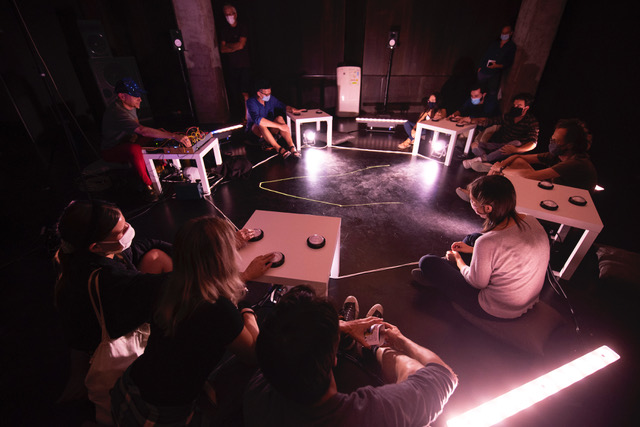Vom 26.-29. Januar widmet sich das Festival “SPIEL! Games as critical practice” in Basel dem kritischen Potential des Spielens. Der Komponist Michel Roth hat das Festival kuratiert.

Friederike Kenneweg
Wer sich mit Michel Roth über das Spielen unterhält, kommt nicht umhin zu entdecken, dass es eigentlich nicht nur ein Thema, sondern ein multidimensionales Themenfeld ist, das sich da eröffnet. Denn spielen lässt sich ja mit ganz Unterschiedlichem: mit Worten, Dingen, Gedanken, Klängen, Farben oder Instrumenten… Ein Spiel gibt Regeln vor und kreiert für die Dauer des Spiels eine eigene Welt, sei es in der Musik, im Computer-, im Rollen- oder im Brettspiel. Wer sich selbst als Spieler:in in einer solchen Welt begreift, hält nach den Regeln Ausschau, nach denen gespielt wird. Jede:r Spieler:in hat die Möglichkeit, das Spiel innerhalb des ihm oder ihr vorgegebenen Raums zu beeinflussen. Aber die Regeln, nach denen gespielt wird, können auch verändert werden – und schon offenbart sich eine philosophische oder politische Dimension des Spielens. Spielen kann zwar zur Weltflucht dienen und zu einem gewissen Eskapismus führen. Es kann aber auch ein kritisches, gar weltveränderndes Potential entfalten.
Mary Flanagans “Critical Play”
Diesen Gedanken fand Michel Roth besonders prägnant in den Schriften der U.S.-amerikanischen Game Designerin Mary Flanagan ausformuliert, auf die er bei seinen Recherchen zu Games und Spielen gestoßen war. Vor allem beeindruckte ihn Flanagans Buch “Critical Play. Radical Game Design” aus dem Jahr 2009, in dem sie aus der Sicht der Gestalterin das kritische Potential betont, das im Setting von Spielen liegen kann. Welche Bilder, Klischees und Vorstellungen sollen reproduziert, welche sollen verändert werden? In welchem Möglichkeitsraum sollen sich die Spielenden für die Dauer des Spiels aufhalten? Wie Spiele gestaltet sind, kann auch darauf Einfluss nehmen, wie wir hinterher unsere reale Lebenswelt sehen, und vielleicht auch: was wir darin verändern wollen.
Himmel und Hölle
Beim Festival in Basel wird Mary Flanagan als Keynote-Speakerin dabei sein. Außerdem wird sie im Foyer des Theaters Basel ihr mapscotch-Projekt präsentieren, das auf dem Kreidezeichnungs- und Hüpfspiel “Hopscotch” basiert, das wir als “Himmel und Hölle” kennen. Besucher:innen können ihre persönlichen Himmel und Höllen für das Spiel definieren und den Boden des Foyers über die Dauer des Festivals zu einem individualisierten Hüpf-Parcours werden lassen.
Klang und Struktur des Flipperkastens
Ein Phänomen, das Michel Roth schon lange fasziniert, sind Spielautomaten. Für die ZeitRäume Basel entwarf er 2021 eine “Spiel Hölle”, in der die Soundkulisse von Flipperautomaten maßgeblich den Klang bestimmt.
Kein Wunder, dass solche Automaten auch im Rahmen des Basler Festivals wieder einen Gastauftritt haben werden: In der Alten Billettkasse des Theaters Basel stehen die Flipperautomaten und andere Games dem Publikum zum Ausprobieren (und Anhören) zur Verfügung. In einer Lecture Performance in Zusammenarbeit mit dem Kontrabassisten Aleksander Gabrys beschäftigt sich Michel Roth unter dem Titel Pinball Etudes auch noch einmal mit dem Flipperspiel, diesmal jedoch, indem er einen Kontrabass zu einem Flipper verwandelt und die Saiten mit beweglichen Kugeln präpariert. Normales Instrumentenspiel ist nicht mehr möglich, sondern Aktion und Klang hängen nun auch davon ab, wohin die Kugeln rollen. Was genau geschehen wird, lässt sich weder komponieren noch proben.
Im Stück Räuber-Fragmente nach Robert Walser, hier gespielt vom Ensemble Catrall, wandte Michel Roth erstmals Spieltheorie innerhalb einer Komposition an. Walsers Räuber-Roman wird darin in eine Art Spielanordnung gebracht. Ein freier Improvisator ist auf der Bühne, der ständig in das Stück eingreifen darf, wie eine Art Spielverderber.
Spiel und Komposition
Das Festival präsentiert darüber hinaus eine Vielzahl von Werken solcher Komponist:innen, die sich mit dem Spiel unter verschiedenen Gesichtspunkten auseinandergesetzt haben. Zum Beispiel arbeitet Bernhard Lang unter dem Titel Game seit 2016 an einer Werkreihe, in der er den Instrumentalist:innen einen durch ein festes Regelwerk definierten Spielraum überantwortet, den sie dann aber frei nutzen können. In Basel werden GAME 3-4-3 und Game ONE von Bernhard Lang zu hören sein. Mike Svoboda stellt in Homo ludens (2019) den Spieler:innen fünf Settings zur Auswahl, in denen sie je unterschiedlichen Regeln zu folgen haben. Und Sarah Nemtsov untersucht in ihrem Schlagzeugstück Poker, Roulette (2020) den Gegensatz von Spieltrieb und Spielsucht – zwei Prinzipien, die so nah beieinander zu sein scheinen und doch ganz unterschiedliche Energien mit sich bringen.
Homo Ludens von Mike Svoboda teilt die Musiker:innen in zwei Teams ein. Treten sie beim Musizieren auch gegeneinander an? Hier eine Aufnahme der Uraufführung des Stückes im Gare du Nord, März 2019, mit der Camerata Variabili und den Gästen Mike Svoboda und Lucas Niggli.
Kontrast, Clash, Begegnung
Michel Roth hat sich bewusst entschieden, die thematische Breite, die mit dem Festivalthema einhergeht, nicht einzuschränken, sondern Ansätze aus Game Design, Musikwissenschaft, Performancekunst, Komposition und Pädagogik unmittelbar aufeinander prallen zu lassen. Besonders neugierig ist er darauf, ob sich die unterschiedlichen Zielgruppen auf das jeweils andere Gebiet einlassen werden. Bleiben die Gamer:innen vielleicht auch bei der Neuen Musik hängen? Spielen alle miteinander Mapscotch im Foyer des Theaters Basel? Treffen sie beim Real World Audio Game auf dem Theaterplatz auch mit gänzlich Unbeteiligten aufeinander? Partizipieren alle zusammen am Jeu sonore, zu dem Sébastien Roux und Clément Canonne das Publikum einladen?
Das Festival selbst wird zu einem Möglichkeitsraum, der das Publikum auf vielfältige Weise zum Spielen und Entscheidungen treffen einlädt. Wer sich auf diese Mischung aus Lectures, Konzerten, Installationen und Interaktionen einlässt, kann dabei intellektuell, sinnlich und spielerisch etwas von all dem erfahren, was Spiel ist und sein kann – je nachdem, wohin die Flipperkugel fliegt.
Friederike Kenneweg
Festival “Spiel! Games as critical practice” vom 26.-29. Januar 2023, tagsüber im Foyer des Theater Basel und abends in der Musikakademie bzw. im Jazzcampus.
Bernhard Lang, Sarah Nemtsov, Sébastien Roux, Clément Canonne, Marko Ciciliani, Mary Flanagan, Critical Play: Radical Game Design,
Sendungen im SRF Kultur:
neoblogpost 2.9.2021: Unendliche Spielwelten, Autor: Jaronas Scheurer über das “Spiel Hölle” Projekt von Michel Roth
neo-profile:
Michel Roth, Mike Svoboda, Aleksander Gabrys, sonic space basel

